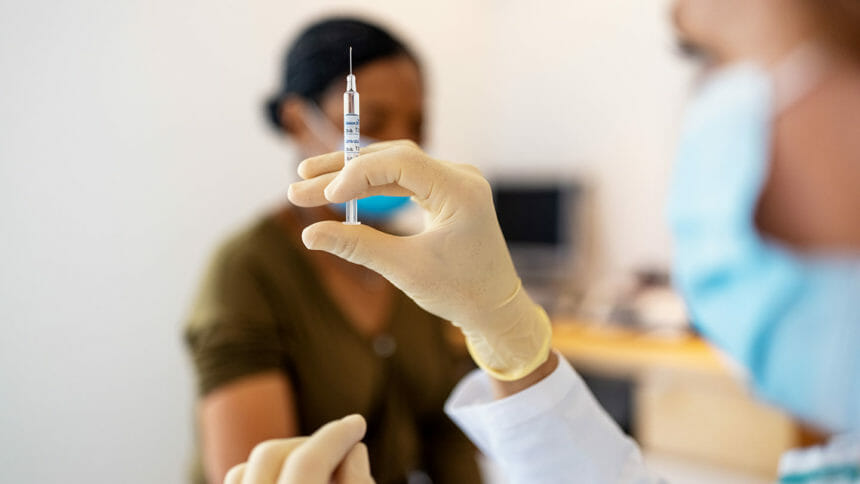
The nation’s largest long-term care advocacy group has launched a major campaign to get seniors in care settings vaccinated against respiratory viruses that hit at this time of year.
The #GetVaccinated campaign from the American Health Care Association/National Center for Assisted Living complements what nursing homes are already doing to boost vaccination rates even as fatigue and barriers to access continue to plague this effort.
“It is a challenge, and I think if the country is committed to making sure older adults have easy access to vaccines, they need to figure out how to solve the problem and not let the free market handle it,” David Gifford, MD, MPH, the chief medical officer at AHCA/NCAL, told McKnight’s Senior Living this week.
The association’s campaign includes a provider checklist with best practices, factsheets that can be distributed to residents, their families, and staff, and in-depth resources about vaccine administration, reimbursement policies, documenting vaccines, and frequently asked questions.
LeadingAge also is involved in efforts to raise awareness about vaccines for seniors, partnering with the US Department of Health and Human Services’s “Risk Less. Do More.” campaign. LeadingAge members can receive research-based messages and materials to increase vaccines in their communities, the association said in a statement sent to McKnight’s Long-Term Care News on Thursday.
“LeadingAge is committed to ensuring the health and safety of older Americans and the people that care for them,” association CEO Katie Smith Sloan said in the release. “The Risk Less. Do More. campaign will help our nonprofit, mission-driven provider members educate the older adults and families they serve about the vaccines for these illnesses, which in turn, will improve the health of their entire community.”
Naysayers rising
A national survey from The Ohio State University Wexner Medical Center published Wednesday in Newswire found that more than 37% of respondents of all ages who have been vaccinated in the past against COVID-19 do not plan to get a shot this year. The same amount said they don’t need flu, pneumococcal and respiratory syncytial virus (RSV) vaccines.
The poll found that adults 65 and older are the most likely to get vaccinated with the recommended shots.
Payment issues in nursing homes, though, can make it more difficult for residents to get vaccinated.
Last month, Chad Worz, chief executive of the American Society of Consultant Pharmacists, told McKnight’s Long-Term News that the billing and reimbursement processes that facilities must utilize continues to cause problems. He said access to vaccines “should” be better than last year.
The US Food and Drug Administration has approved COVID-19 vaccines from Pfizer and Moderna. The #GetVaccinated campaign is supported by Moderna, which AHCA/NCAL said will help in the development of campaign materials. The association said in a press release that it does not recommend specific vaccines or manufactures unless there is “demonstrable evidence it is more effective at protecting residents and staff members.”
Tiring battle
Vaccine fatigue is an issue that all long-term care providers are combating.
In July, LeadingAge sent a sternly worded letter to Maj. Gen. (ret) Paul Friedrichs, MD, FACS, director of the Office of Pandemic Preparedness and Response Policy, detailing barriers to vaccination the group has heard from its members. The barriers boiled down to vaccine fatigue, mistrust stemming from the frequently changing federal recommendations for virus mitigation, and the influence of family and friends.
The letter said residents, their families and facility staff “have all been overwhelmed by the number of vaccines,” and they became “confused’ about the number of vaccines required.
“[M]any are reluctant to continually inject vaccine product into their bodies, particularly more than once per year,” the letter said. “Some protection is better than none, but we will get none if we keep moving the target.”AHCA/NCAL is also partnering with the US Department of Health and Human Services’ national campaign Risk Less. Do More., which also seeks to raise awareness of the importance of vaccines.





